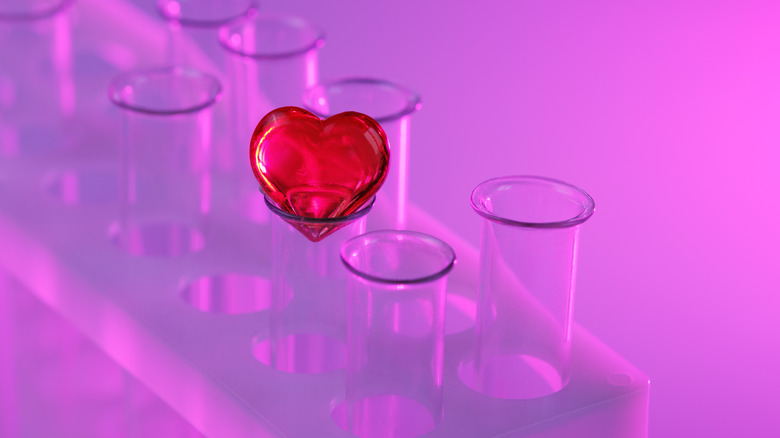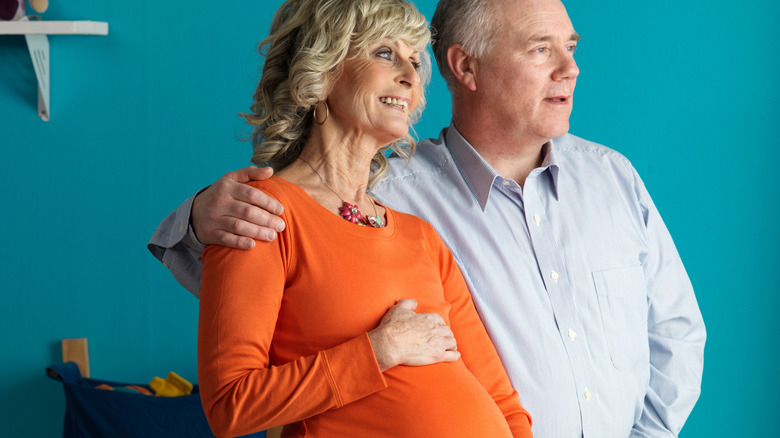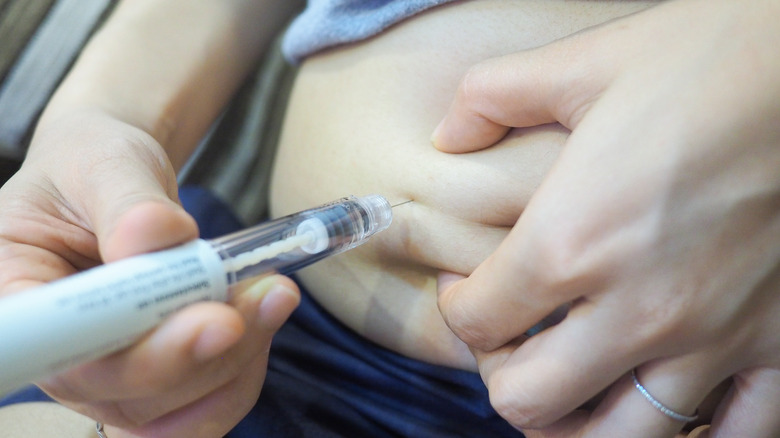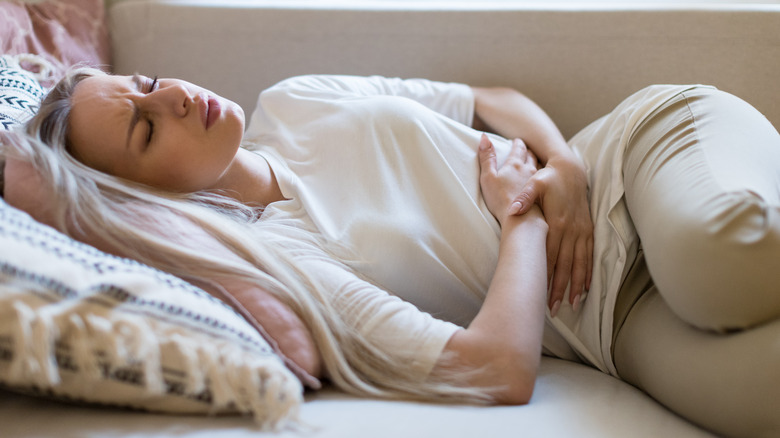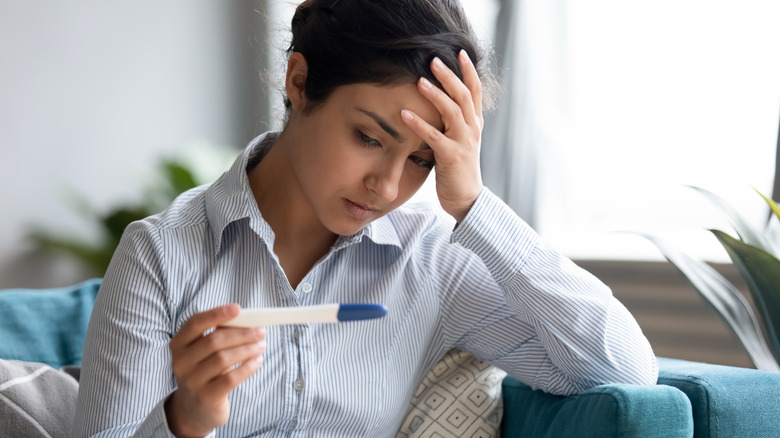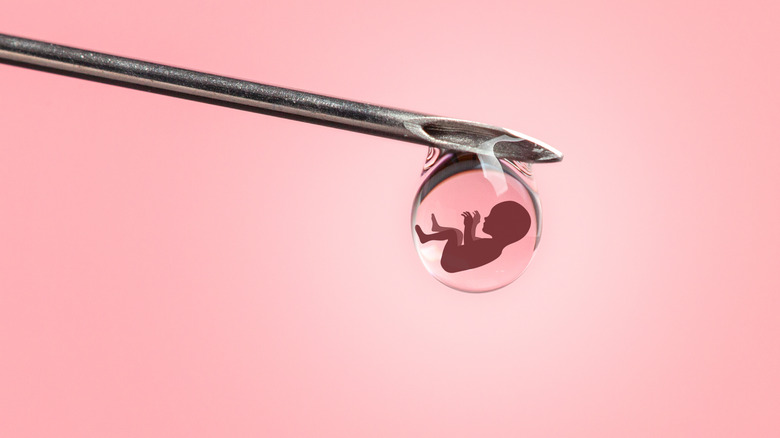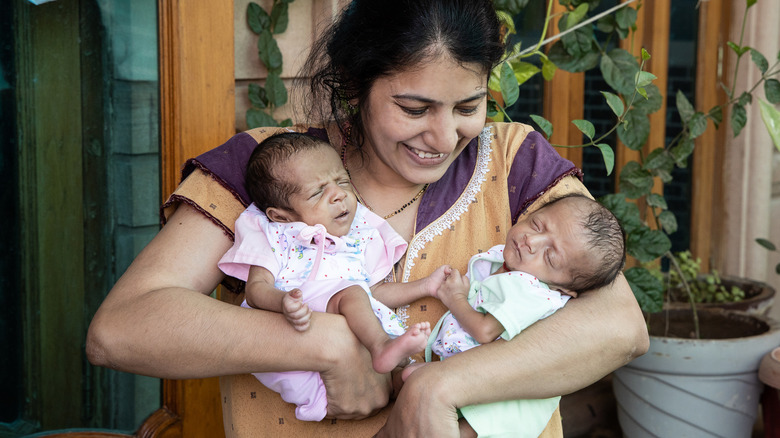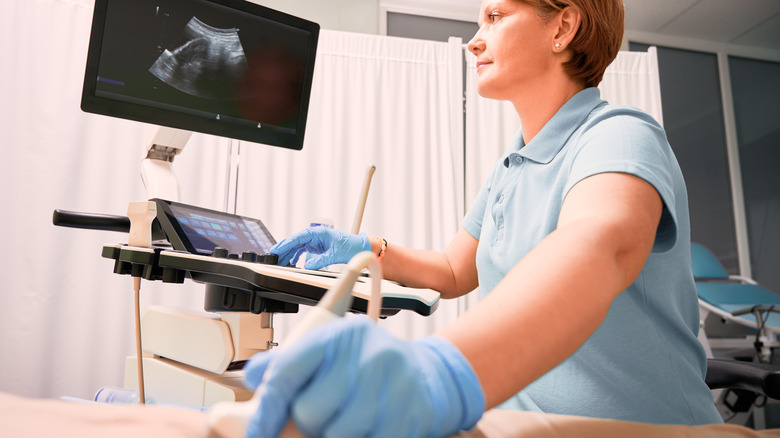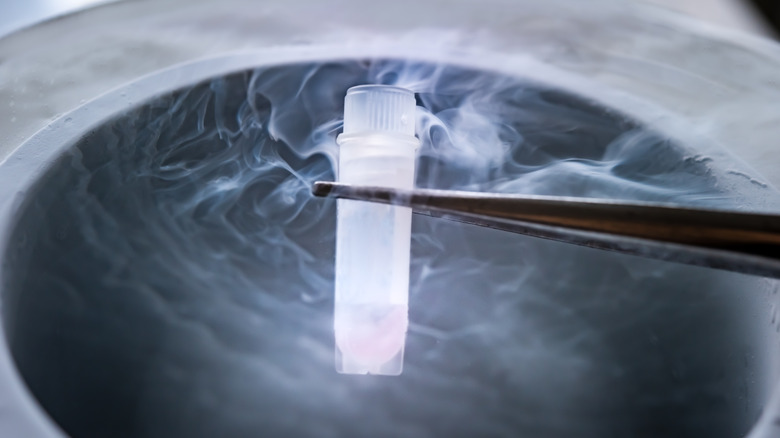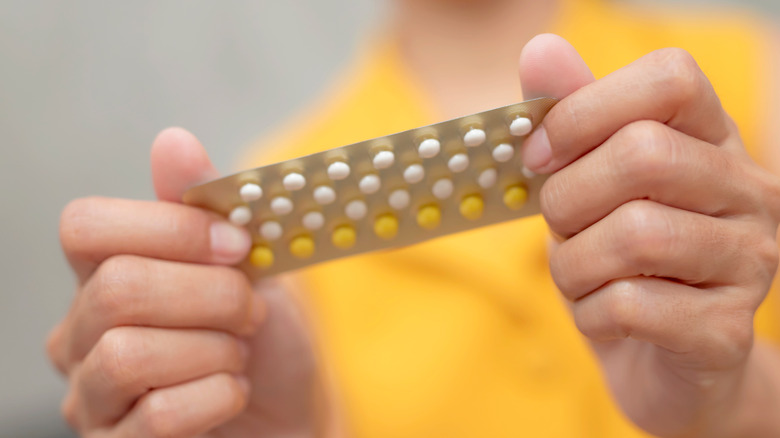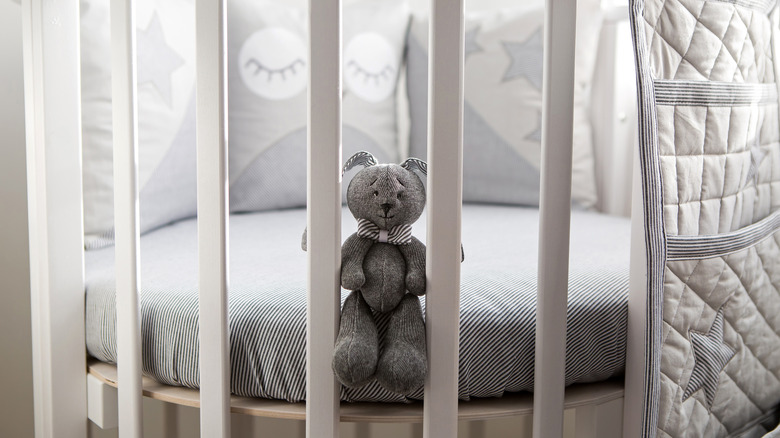Everything You Should Know Before Freezing Your Eggs
Egg freezing has come a long way since it began in the 1980s. Egg freezing cycles were originally developed as a way for women with cancer who were at risk for infertility issues to preserve eggs for future family planning. However, the procedure is now used by women who decide that saving eggs for later use is the best choice for them (via Scientific American).
The very first baby that successfully developed from a frozen egg was born in 1986. At the time, the procedure to freeze eggs was still very experimental. Scientific American reports that it wasn't until 2012 that the American Society of Reproductive Medicine labeled it non-experimental, allowing more women access to the choice to freeze their eggs.
Of course, reproductive health and family planning look a little different for everyone, and egg freezing may not be the right solution for every woman. Follow along to learn what to consider before undergoing egg freezing cycles.
Reasons you might want to freeze your eggs
Perhaps the most obvious reason for women to want to freeze their eggs is for future family planning. For instance, women with demanding careers may want to hold off on having kids until they feel it's the right time. Or, a woman might want to save her eggs until she finds a partner to plan a family with. OB-GYN Kathleen Mundy tells Houston Methodist that freezing eggs at a younger age could yield a better chance of pregnancy later. "Egg freezing can help preserve fertility," Mundy explains. "Studies suggest that women who freeze their eggs before age 35 have a better chance of a successful pregnancy than those who freeze their eggs after age 35."
There are other reasons someone might consider freezing her eggs, though. As mentioned, egg freezing began as a way for cancer patients to potentially have kids despite infertility problems that can arise from cancer treatments (per Scientific American). Typically, the best results are achieved when egg freezing begins before the start of cancer treatments (per the American Cancer Society).
Transgender men may also opt for egg freezing to assist with their future family planning. Extend Fertility explains that testosterone therapy can negatively impact fertility. Freezing eggs before starting this therapy may help transgender men preserve eggs for future use.
Egg freezing is a detailed series of cycles
One of the most important things you can do for yourself before deciding whether egg freezing is right for you is to understand how egg freezing cycles work. The full process might be more than you expected.
The Mayo Clinic breaks down the cycle into three steps: ovarian stimulation, egg retrieval, and egg freezing. During ovarian stimulation, women will take hormone medications to trigger the production of multiple eggs. This typically happens over 10 to 12 days through a series of daily injections. A doctor monitors the patient via ultrasounds and blood tests.
During egg retrieval, your doctor will use a transvaginal ultrasound probe, needle, and suction tool to guide eggs out of the follicle to freeze. Then, the eggs undergo freezing in a lab to preserve them (via the Mayo Clinic).
Some women do not respond as well to hormone medications as others, leaving them with fewer viable eggs. In this case, they may need to go through a few egg freezing cycles to have enough potentially viable eggs for future pregnancies (via USC Fertility).
There are lots of potential risks and side effects
Egg freezing cycles are medical procedures and, therefore, come with the risk of side effects and potential health problems. Fortunately, MU Health Care states that most women experience mild side effects, such as irritability, breast tenderness, and headaches. After the retrieval procedure, it's also common to feel cramping, which usually goes away within a couple of days. However, other women have more severe side effects, such as infection, bleeding, or damage to the bladder.
A rare but potentially serious problem called ovarian hyperstimulation syndrome (OHSS) can result from hormone therapy treatments. American Society for Reproductive Medicine practice committee chair Dr. Samantha Pfeifer tells PBS that women with OHSS wind up with swollen and painful ovaries from an excess amount of ovarian fluid production. In rare cases, the condition can cause blood clots or become fatal. "It can be managed," Pfeifer says. "But you can't always predict who will get it or 100 percent prevent it."
It can also take a toll on your mental health
It's also crucial to think about your mental health if you're considering freezing your eggs. Some research has pinpointed a few possible implications that egg freezing cycles could have on your mental well-being.
For example, a 2020 study in the Journal of Assisted Reproduction and Genetics found that women who underwent in vitro fertilization (IVF) or egg freezing self-reported stress during their fertility cycle. Furthermore, women undergoing multiple cycles reported more stress. Another study in a 2018 edition of Fertility and Sterility found that 16% of women reported feeling moderate to severe regret about freezing their eggs. Some of those women stated that a lack of emotional support was one of the reasons they regretted their decision.
Perhaps that's why women's medical clinic startup Tia and UCSF Health have blended their healthcare services with mental health and wellness services. Fierce Healthcare reports that rather than making women move between specialists for their healthcare needs, the partnership includes support for physical, reproductive, and mental health in one facility, creating a new approach to women's healthcare.
Freezing eggs and freezing embryos are two different things
Although you might hear the terms "frozen eggs" and "frozen embryos" used interchangeably, they are two different things. It's important to know the difference to ensure that you're using the reproductive process that works best for you.
A frozen egg is an unfertilized egg removed from a woman's body and frozen for later use. Women without a partner or those who simply want to wait until later to decide on whether they want to have children might choose this option. Cancer patients who want to save their eggs now before undergoing treatments may also opt for egg freezing.
On the other hand, a frozen embryo is an egg fertilized with sperm and then frozen in a similar fashion. According to OC Fertility, this option is a bit more reliable in terms of seeing how many embryos could be viable. When you freeze your eggs, medical professionals cannot tell whether their quality is high enough to result in pregnancy until they're fertilized.
Younger eggs could yield better results
You may have heard that freezing your eggs when you're younger could yield a higher chance of pregnancy later on. According to research and medical experts, that information is correct. A 2015 study looked at live births from women who froze their eggs between 25 and 40 years of age to determine the best age range for pursuing a cycle. Researchers found that freezing eggs before 34 years resulted in the highest amount of live births, at 74%.
Why is it that younger eggs seem to fare better than eggs from older women? According to UPMC Health Beat, the number of eggs a woman has in her body decreases every year. Beginning in the 30s, fertility declines, affecting the quality and quantity of her eggs. Infertility specialist and endocrinologist Dr. Jaime Knopman tells PBS, "The most important thing for eggs is time. The younger the egg, the healthier it is."
Prepare to get tested before starting the process
Before beginning an egg freezing cycle, be prepared to go through several tests. While these tests can take time and extra money out of your pocket, they're necessary to determine the health of your eggs and your overall health.
USC Fertility notes some fertility-related testing you'll need before starting a cycle. Depending on your health and situation, your doctor might recommend testing your blood for Anti-Müllerian hormone (AMH) to determine your egg quantity. Estradiol and follicle stimulating hormone (FSH) blood tests may also be used to explore your potential egg quantity. Doctors usually also perform an ultrasound to take a closer look at your ovaries and uterus.
Other blood tests are common for women considering egg freezing, too. According to Extend Fertility, your doctor may recommend testing for sexually transmitted infections, thyroid hormones, blood count, and blood type. Women should also have their routine pap smear completed, and those who are 40 or older may need a mammogram.
Eggs can remain frozen for longer than you might think
Don't think that once you have your eggs frozen, they're only good for a year or two. You have plenty of time to decide what to do with them, if anything, according to the experts.
Although the overall consensus has historically been that frozen eggs won't last longer than a couple of years, more modern technology has allowed them to have a much longer shelf life than they originally had. Reproductive endocrinologist Sharon Jaffe tells Insider, "A woman's eggs can be frozen for long periods of time without issue. There have been children born with eggs frozen for several years. The eggs should be able to remain frozen for as long as the patient needs them to be frozen; whether they are freezing it for one year or 10 years should not cause any difference in the quality of the egg."
As USC Fertility explains, the freezing process for eggs is similar to that of freezing embryos. Frozen embryos can successfully last for decades and still result in pregnancy; frozen eggs can also achieve those results. The clinic notes that babies have reportedly been born from eggs frozen for over 14 years.
It can be incredibly expensive
If you're familiar with routine healthcare costs, then you might imagine that freezing your eggs won't be easy on your wallet. However, the actual potential costs might surprise you.
While egg freezing costs vary by clinic and geolocation, Modern Fertility says that the cost may range from $5,000 to $10,000 — and that's just for the actual procedure of removing your eggs and freezing them. Storage fees and medication can increase what you pay by the thousands. Fertility IQ notes that storage fees can be about $500 a year, although some clinics give you your first year of storage free.
What's also important to note is that your health insurance isn't required to cover part or any of your costs for freezing your eggs (via PolicyAdvice). However, yours might, so it's important to check with your insurance carrier first. Reproductive endocrinologist Sharon Jaffe adds (via Insider) to check with your employer. "There are now companies offering their employees elective egg freezing as a benefit. They are trying to recruit good employees," explains Jaffe. For instance, technology company Pendo offers $2,500 to employees for fertility treatments and other reproductive procedures (per WRAL).
Your diet is super important to egg freezing success
Sharon Jaffe also explains (via Insider) that a healthy diet can be instrumental in the success of egg freezing. "If a woman is looking to do elective egg freezing, I highly recommend she puts herself on a healthy diet, avoids trans fats, and should maybe start taking an Omega-3 pill and prenatal vitamins," says Jaffe. "Women interested in freezing their eggs should avoid all nicotine recreational drugs, alcohol, and limit their caffeine intake so that helps optimize her egg quality." According to Extend Fertility, the foods we can eat can impact fertility, so being mindful of your diet is important.
LA IVF Clinic also suggests going the route of an anti-inflammatory diet, which weeds out a lot of processed, fatty, and sugary foods. The overall idea is to eat as cleanly as possible with plenty of nutritious whole foods, fruits, vegetables, and whole grains. For breakfast, try avocado toast or oatmeal. Eat salads topped with protein (like fish or chicken) for lunch, and fill up on whole grain bowls with fresh vegetables and protein for dinner. Add healthy snacks through the day, like fruit, yogurt, or a smoothie.
Talk to your doctor about exercising during the process
During an egg freezing cycle, you may have loads of questions for your doctor. One of them is likely whether you should keep your regular exercise routine, as you might be concerned about putting too much stress on your body.
Dr. Klein from Extend Fertility explains that during an egg freezing cycle, hormone treatments increase the size of your ovaries as they stimulate egg production. Although rare, exercise may increase ovarian torsion, which happens when the ovaries twist around supporting ligaments. However, low-impact exercise may be okay for most women, so stick to stuff like yoga or walking. Your doctor will know your specific health information and will be able to answer the question based on that information.
UW Medicine adds that after egg retrieval, women should rest for the rest of the day. Additionally, they should avoid high-impact exercising and heavy lifting for the day of retrieval, as well as the day after.
You may also need to stop your birth control
Another conversation to have with your doctor is what should happen with your birth control if you plan to freeze your eggs. The decision may depend on the type of birth control you use.
A Reproductive Biomedicine Online study explored the effects of hormonal contraception on the concentration of anti-Müllerian hormone (AMH) in the body. AMH can help medical professionals see how many potentially viable eggs a woman may have left in her body, so it's a crucial measurement in the egg freezing cycle. The study found that the duration of hormonal contraceptive use negatively impacted AMH serum concentration and ovarian volume. Researchers concluded that in women taking hormonal contraceptives, AMH and other ovarian markers might not be as accurate.
Another study in a 2013 edition of Reproductive Biology and Endocrinology found that women using hormonal contraceptives within one month prior to egg retrieval had lower egg retrieval counts than women who were not taking hormonal contraceptives or were using anti-androgenic birth control.
Not all fertility clinics will be right for you
Finding a fertility clinic that you feel 100% comfortable with is one of the most important steps you can take before beginning an egg freezing cycle. Some clinics specialize in specific situations, such as infertility or in vitro fertilization. However, you'll want to make sure that your fertility clinic has plenty of experience working with women who freeze their eggs, specifically.
Verywell Family suggests finding the answers to several questions when researching clinics, either by looking at information on their websites, calling the clinic, or setting up a consultation. A few things you should find out: their hospital affiliation, the credentials of their staff and doctors, and how you can finance your treatments. When getting your answers, consider how comfortable you felt speaking with the representative, how well they responded to your concerns, and whether their services meet your expectations. There's nothing wrong with having consultations with multiple clinics until you find one that feels like the right fit.
It's unfortunately not a sure thing
Freezing your eggs to help you plan for the future can be exciting. Still, it's important to know that there's no guarantee that your eggs will result in a future pregnancy. In fact, infertility specialist Emily Goulet calls it "an expensive lottery ticket" (via NBC News). As Goulet puts it: "If you win, you get the best payout ever: You get a child. But if you don't win, you feel scammed." Gynecologist Sarah Martins Da Silva further explains to BBC that an egg freezing cycle includes a lot of steps and variables: "Not every egg makes an embryo, not every embryo makes a pregnancy and not every pregnancy makes a baby." That's precisely why most egg freezing cycles require the retrieval of several eggs.
Fortunately, technology has improved egg freezing, which may result in better reliability for a future pregnancy. Still, your doctor can't give you an estimate of your chances of success, as they won't have any data about your frozen eggs, Yale Fertility Center director Dr. Pasquale Patrizio tells NBC News.
Chair of the Human Fertilisation and Embryology Authority Sally Cheshire says in a press release that women have an 18% success rate when using their own eggs, but that still doesn't guarantee a successful birth. "Clinics have an ethical responsibility to be clear that egg freezing below the age of 35 offers women their best chance of creating their much longed-for family," says Cheshire.

